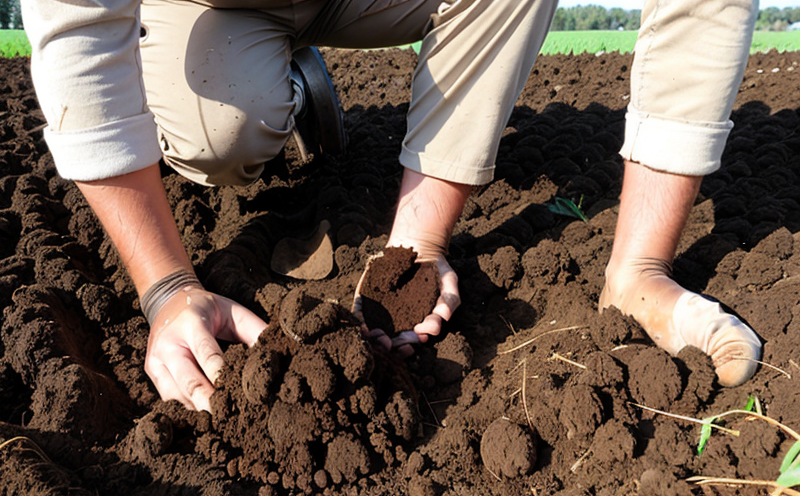Soil Salinity Testing
The assessment of soil salinity is a critical process within the agriculture and forestry sectors. Soil salinity refers to the presence of soluble salts in the soil, which can significantly impact plant growth and agricultural productivity. Excessive salt levels can hinder the absorption of water by plants, leading to reduced crop yields and even death. Therefore, accurate and reliable soil salinity testing is essential for maintaining optimal soil conditions.
Our laboratory offers a comprehensive service for measuring soil salinity using advanced analytical techniques that comply with international standards such as ISO 7865-2:1993 and EN ISO 14675. We use state-of-the-art equipment, including conductivity meters and ion selective electrodes, to ensure precise measurements.
The process of soil salinity testing involves several steps:
- Sample Collection: Soil samples are collected from various depths within the root zone to provide a representative sample of the soil's salt content.
- Sample Preparation: The collected soil is air-dried, sieved, and mixed thoroughly before undergoing analysis.
- Measurement: Conductivity meters or ion selective electrodes are used to measure the electrical conductivity (EC) of the soil extract. This value is then converted into salt concentration using calibration curves specific to different soil types.
- Data Analysis: The data obtained from these measurements is analyzed against industry standards and benchmarks to determine if the soil salinity falls within acceptable limits for optimal plant growth.
- Reporting: A detailed report is prepared, including raw data, calculated EC values, and recommendations for corrective actions if necessary. This report serves as a valuable resource for quality managers, compliance officers, R&D engineers, and procurement teams involved in agricultural or forestry projects.
The importance of accurate soil salinity testing cannot be overstated. By identifying and addressing high levels of soil salinity early on, farmers and foresters can take proactive measures to improve crop health and yield. Our laboratory ensures that this process is both efficient and effective, providing clients with actionable insights that contribute directly to their operational success.
In addition to our core testing services, we also offer consulting services aimed at helping our clients develop strategies for managing soil salinity issues. These might include recommendations on irrigation practices, fertilizer use, or even the implementation of specialized drainage systems.
Customer Impact and Satisfaction
- Improved Crop Yield: By identifying and addressing soil salinity issues early, our clients have seen significant increases in their crop yields. This translates directly into higher returns on investment for farmers.
- Enhanced Product Quality: Plants grown in healthy soils tend to produce better quality products with improved nutritional content. Our testing services help ensure that this is the case.
- Sustained Business Operations: Preventive measures against soil salinity can prevent costly disruptions and downtime, contributing to more stable business operations.
- Environmental Stewardship: By maintaining optimal soil conditions, our clients contribute positively to environmental sustainability efforts. This includes reducing water usage, minimizing chemical inputs, and promoting biodiversity.
Customer satisfaction is paramount for us. We continuously strive to provide high-quality services that meet the needs of our diverse clientele. Our dedicated team of experts ensures that every test conducted meets rigorous quality control standards, leading to reliable results that can be trusted.
Environmental and Sustainability Contributions
The assessment of soil salinity plays a crucial role in environmental sustainability efforts within the agriculture and forestry sectors. Excessive salt levels not only affect plant health but also contribute to broader ecological imbalances. By addressing these issues through accurate testing and informed management practices, our clients can play an active part in preserving natural resources.
Our laboratory adheres to strict environmental policies that ensure minimal impact on the environment throughout all stages of sample handling and analysis. Additionally, we encourage sustainable agricultural practices that promote long-term soil health and resilience against climate change impacts.
Use Cases and Application Examples
Soil salinity testing finds application in various scenarios within the agriculture and forestry sectors:
- Crop Rotation Planning: Understanding soil salinity helps determine which crops can be successfully grown in specific fields, aiding in effective crop rotation planning.
- Irrigation Management: Accurate measurements allow for efficient irrigation scheduling that minimizes water waste and prevents over-salination of soils.
- Soil Rehabilitation Projects: In areas where soil salinity is a significant challenge, our testing services inform the design and implementation of rehabilitation projects aimed at restoring soil fertility.
- Precision Agriculture: Modern farming practices such as precision agriculture rely heavily on precise soil data. Our tests provide crucial input for optimizing field-specific interventions.
These use cases demonstrate how our soil salinity testing services contribute to sustainable agricultural and forestry practices, ensuring productivity while protecting natural resources.





